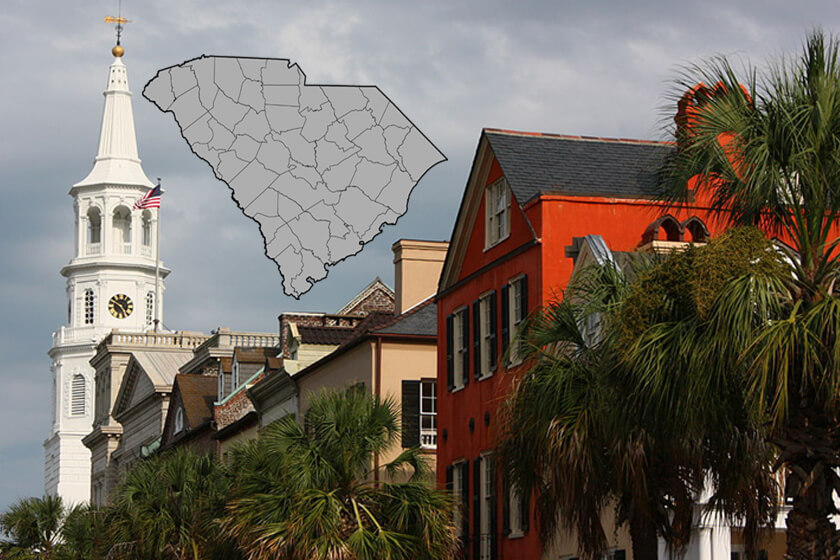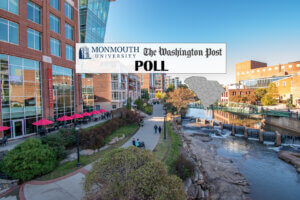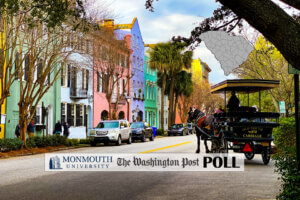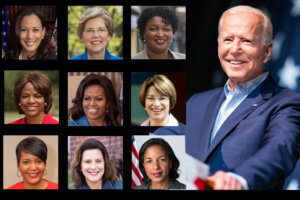West Long Branch, NJ – Former Vice President Joe Biden is the clear front-runner among likely Democratic primary voters in South Carolina in the first Monmouth University Poll here for the 2020 cycle. Biden has majority support among African American voters, a group that is significantly less liberal than white voters in the Democratic electorate.
Biden currently holds 39% support among South Carolina voters who are likely to vote in the February 2020 Democratic primary. The next tier of candidates includes California Sen. Kamala Harris (12%), Vermont Sen. Bernie Sanders (10%), and Massachusetts Sen. Elizabeth Warren (9%). South Bend Mayor Pete Buttigieg registers 5% support. New Jersey Sen. Cory Booker and former hedge fund manager Tom Steyer each earn 2%, while Colorado Sen. Michael Bennet, Minnesota Sen. Amy Klobuchar, and former Texas Rep. Beto O’Rourke each have 1% support. The remaining 15 candidates included in the poll earn less than 1% or were not chosen by any respondents. Another 17% of likely voters say they are not leaning toward any candidate in this race, which is a slightly higher number than in other early 2020 states that Monmouth has polled over the past few months (12% in Iowa in April, 11% in New Hampshire in May, and 8% in Nevada in June).
Biden has widespread support among black voters (51%), a group that makes up more than 6-in-10 likely primary voters. His support among white voters (24%) is less than half that level. Among the top five candidates, two earn significantly higher support among white voters than black voters: Warren (21% white and 2% black) and Buttigieg (11% white and 1% black). The remaining candidates draw equal support from both groups: Harris (12% white and 12% black) and Sanders (10% white and 10% black).
Biden has slightly higher support among men (45%) than women (36%). The same is true for Harris (16% men and 9% women). However, women (23%) are much more likely than men (7%) to say they have no candidate preference at this stage of the race.
Biden also does significantly better among moderate to conservative voters (48%) than he does among self-described liberals (27%). This finding, though, correlates with the fact that black voters (76%) in South Carolina are more likely than white voters (43%) to see themselves more as centrists.
“South Carolina is the first state on the Democrats’ 2020 calendar with a majority black electorate. Despite some supposed missteps on the issue of race, Biden maintains widespread support with this voting bloc,” said Patrick Murray, director of the independent Monmouth University Polling Institute.
The Monmouth University Poll asked likely Democratic primary voters to rate 25 announced candidates in the race. Biden holds the most positive rating at 79% favorable to 9% unfavorable (82% to 4% among black voters and 74% to 19% among white voters). Other candidates with strong positive ratings are Warren (67% to 7%), Harris (64% to 6%), and Sanders (67% to 14%). The two women get better ratings among white voters (85% to 9% for Warren and 77% to 5% for Harris) than among black voters (56% to 7% for Warren and an identical 56% to 7% for Harris), due largely to higher name recognition among the former group. Sanders actually does better among black voters (68% to 9%) than white voters (64% to 23%) due to higher unfavorable ratings from the latter group. Booker also earns a largely positive rating (49% to 12%, including 55% to 18% among whites and 45% to 10% among blacks), but is somewhat less known than the top four candidates.
Buttigieg (36% to 11%) and O’Rourke (32% to 18%) also earn net positive ratings. Buttigieg has significantly better ratings among white voters (63% to 11%) than black voters (20% to 12%). The ratio of positive to negative ratings for O’Rourke is similar in both groups (44% to 29% among whites and 24% to 13% among African Americans). South Carolina Democrats tend to be less familiar with the field of candidates when compared with likely voters in Iowa, New Hampshire, and Nevada, according to Monmouth University polls in those states. This is driven largely by lower familiarity among black voters, which is especially true for Buttigieg and O’Rourke.
“Black Democrats tend to be more moderate than white primary voters. Biden is the best known candidate currently occupying that lane,” said Murray.
|
2020 DEMOCRATIC FIELD SOUTH CAROLINA PARTY VOTER OPINION | ||||
| Total w/ opinion | Net rating | Favorable | Unfavorable | |
| 88 | Joe Biden | +70 | 79 | 9 |
| 81 | Bernie Sanders | +53 | 67 | 14 |
| 74 | Elizabeth Warren | +60 | 67 | 7 |
| 70 | Kamala Harris | +58 | 64 | 6 |
| 61 | Cory Booker | +37 | 49 | 12 |
| 50 | Bill de Blasio | –2 | 24 | 26 |
| 50 | Beto O’Rourke | +14 | 32 | 18 |
| 47 | Pete Buttigieg | +25 | 36 | 11 |
| 44 | Kirsten Gillibrand | +10 | 27 | 17 |
| 42 | Amy Klobuchar | +22 | 32 | 10 |
| 41 | Julián Castro | +21 | 31 | 10 |
| 38 | Tom Steyer | +4 | 21 | 17 |
| 33 | Tulsi Gabbard | +7 | 20 | 13 |
| 30 | Tim Ryan | +4 | 17 | 13 |
| 27 | Marianne Williamson | –9 | 9 | 18 |
| 27 | Andrew Yang | –1 | 13 | 14 |
| 23 | Michael Bennet | +7 | 15 | 8 |
| 23 | John Delaney | +1 | 12 | 11 |
| 23 | John Hickenlooper | +1 | 12 | 11 |
| 21 | Jay Inslee | +1 | 11 | 10 |
| 19 | Steve Bullock | –1 | 9 | 10 |
| 15 | Seth Moulton | –3 | 6 | 9 |
| 14 | Mike Gravel | –6 | 4 | 10 |
| 14 | Wayne Messam | –8 | 3 | 11 |
| 14 | Joe Sestak | –4 | 5 | 9 |
The overwhelming majority (65%) of likely Democratic voters in South Carolina say they prefer a nominee who would be a strong candidate against Trump even if they disagree with that candidate on most issues. If they were forced to choose, just 23% say they would favor a Democratic candidate who they are aligned with on the issues even if that person would have a hard time beating Trump. These results are similar to Monmouth’s findings in the other three early states. Biden leads among both groups – 41% support among voters who prioritize electability and 37% among voters who prioritize issue alignment.
The top issue that Palmetto State Democrats are thinking about in choosing a presidential nominee is health care (48%), which has been the case in other Monmouth primary polls (51% Iowa, 41% New Hampshire, and 41% Nevada). Other important issues include immigration (15%), environmental concerns (9% climate change and 6% environment in general), jobs and unemployment (14%), honesty and integrity (12%), beating Trump (11%), and education (10%). Environmental concerns are relatively less important in South Carolina than they are for Democrats in the other early states – 15% versus 29% in Iowa, 24% in New Hampshire, and 24% in Nevada.
The Monmouth University Poll was conducted by telephone from July 18 to 22, 2019 with 405 South Carolina voters who are likely to vote in the Democratic presidential primary in February 2020, out of 659 registered voters that were contacted for the poll. The question results in this release have a margin of error of +/- 4.9 percentage points. The poll was conducted by the Monmouth University Polling Institute in West Long Branch, NJ.
QUESTIONS AND RESULTS
(* Some columns may not add to 100% due to rounding.)
1. If the Democratic primary election for president was today, would you vote for [NAMES WERE ROTATED]? [If UNDECIDED: If you had to vote for one of these candidates at this moment, who do you lean toward?]
| (with leaners) |
July 2019 |
| Joe Biden | 39% |
| Kamala Harris | 12% |
| Bernie Sanders | 10% |
| Elizabeth Warren | 9% |
| Pete Buttigieg | 5% |
| Cory Booker | 2% |
| Tom Steyer | 2% |
| Michael Bennet | 1% |
| Amy Klobuchar | 1% |
| Beto O’Rourke | 1% |
| Julián Castro | <1% |
| Bill de Blasio | <1% |
| Tulsi Gabbard | <1% |
| Kirsten Gillibrand | <1% |
| Jay Inslee | <1% |
| Steve Bullock | 0% |
| John Delaney | 0% |
| Mike Gravel | 0% |
| John Hickenlooper | 0% |
| Wayne Messam | 0% |
| Seth Moulton | 0% |
| Tim Ryan | 0% |
| Joe Sestak | 0% |
| Marianne Williamson | 0% |
| Andrew Yang | 0% |
| (VOL) No one | <1% |
| (VOL) Undecided | 17% |
| (n) | (405) |
2. And who would be your second choice?
| (with leaners) |
July 2019 |
| Kamala Harris | 16% |
| Bernie Sanders | 13% |
| Joe Biden | 11% |
| Elizabeth Warren | 10% |
| Cory Booker | 5% |
| Pete Buttigieg | 4% |
| Amy Klobuchar | 1% |
| Beto O’Rourke | 1% |
| Tom Steyer | 1% |
| Steve Bullock | <1% |
| Bill de Blasio | <1% |
| John Delaney | <1% |
| Tulsi Gabbard | <1% |
| Kirsten Gillibrand | <1% |
| Andrew Yang | <1% |
| Michael Bennet | 0% |
| Julián Castro | 0% |
| Mike Gravel | 0% |
| John Hickenlooper | 0% |
| Jay Inslee | 0% |
| Wayne Messam | 0% |
| Seth Moulton | 0% |
| Tim Ryan | 0% |
| Joe Sestak | 0% |
| Marianne Williamson | 0% |
| (VOL) No one | 5% |
| (VOL) Undecided | 30% |
| (n) | (405) |
3. I’m going to read you the names of some people who are running for president in 2020. Please tell me if your general impression of each is favorable or unfavorable, or if you don’t really have an opinion. If you have not heard of the person, just let me know. [NAMES WERE ROTATED]
| Favorable | Unfavorable | No opinion | Not heard of | (n) | |
| Former Vice President Joe Biden | 79% | 9% | 10% | 1% | (405) |
| Vermont Senator Bernie Sanders | 67% | 14% | 16% | 2% | (405) |
| Massachusetts Senator Elizabeth Warren | 67% | 7% | 16% | 10% | (405) |
| Former Texas Congressman Beto O’Rourke | 32% | 18% | 28% | 23% | (405) |
| California Senator Kamala Harris | 64% | 6% | 18% | 13% | (405) |
| Minnesota Senator Amy Klobuchar | 32% | 10% | 28% | 30% | (405) |
| South Bend, Indiana Mayor Pete Buttigieg | 36% | 11% | 28% | 25% | (405) |
| New Jersey Senator Cory Booker | 49% | 12% | 25% | 14% | (405) |
| New York Senator Kirsten Gillibrand | 27% | 17% | 29% | 27% | (405) |
| Former cabinet secretary Julián Castro | 31% | 10% | 33% | 27% | (405) |
| Former Maryland Congressman John Delaney | 12% | 11% | 45% | 33% | (405) |
| Former Colorado Governor John Hickenlooper | 12% | 11% | 36% | 41% | (405) |
| Hawaii Congresswoman Tulsi Gabbard | 20% | 13% | 33% | 34% | (405) |
| Washington Governor Jay Inslee | 11% | 10% | 32% | 46% | (405) |
| Entrepreneur Andrew Yang | 13% | 14% | 34% | 40% | (405) |
| Author Marianne Williamson | 9% | 18% | 32% | 42% | (405) |
| Miramar, Florida Mayor Wayne Messam | 3% | 11% | 25% | 60% | (405) |
| Former Alaska Senator Mike Gravel | 4% | 10% | 32% | 53% | (405) |
| Ohio Congressman Tim Ryan | 17% | 13% | 41% | 29% | (405) |
| Massachusetts Congressman Seth Moulton | 6% | 9% | 33% | 53% | (405) |
| Former Pennsylvania Congressman Joe Sestak | 5% | 9% | 32% | 54% | (405) |
| Montana Governor Steve Bullock | 9% | 10% | 37% | 45% | (405) |
| Colorado Senator Michael Bennet | 15% | 8% | 32% | 45% | (405) |
| New York City Mayor Bill de Blasio | 24% | 26% | 31% | 19% | (405) |
| Former hedge fund manager Tom Steyer | 21% | 17% | 28% | 34% | (405) |
4. Which type of candidate would you prefer if you had to make a choice between: a Democrat you agree with on most issues but would have a hard time beating Donald Trump or a Democrat you do NOT agree with on most issues but would be a stronger candidate against Donald Trump? [CHOICES WERE ROTATED]
|
July 2019 | |
| Agrees with but hard time beating Trump | 23% |
| Do not agree with but stronger against Trump | 65% |
| (VOL) Rejects choice / no need to pick between two | 4% |
| (VOL) Don’t know | 8% |
| (n) | (405) |
5. What are the one or two most important issues to you in deciding who to support for the Democratic nomination? [LIST WAS NOT READ]
[Note: Results add to more than 100% because multiple responses were accepted]
|
July 2019 | |
| Jobs, unemployment | 14% |
| Bills, food, groceries | 1% |
| College tuition, school costs | 6% |
| Health care | 48% |
| Social Security, seniors | 6% |
| Taxes | 6% |
| Climate change, global warming | 9% |
| Environment, pollution | 6% |
| Opioids, drug use | 1% |
| Safety, crime | 1% |
| Guns, gun control | 1% |
| Terrorism, national security | 1% |
| Immigration | 15% |
| Schools, education | 10% |
| Civil rights | 8% |
| Reproductive rights, women | 4% |
| Honesty, integrity | 12% |
| Competence, experience | 6% |
| Income inequality, wages | 8% |
| Infrastructure | 2% |
| Foreign policy, world standing | 4% |
| Balance budget | 2% |
| Donald Trump, beating Trump | 11% |
| Other | 2% |
| Don’t know | 7% |
| (n) | (405) |
METHODOLOGY
The Monmouth University Poll was sponsored and conducted by the Monmouth University Polling Institute from July 18 to 22, 2019 with a statewide random sample of 659 South Carolina voters drawn from a list of registered voters who participated in a primary election in the past two election cycles or voted in both the 2016 and 2018 general elections. Results are based on 405 voters who are likely to vote in the Democratic presidential primary in February 2020. This includes 162 contacted by a live interviewer on a landline telephone and 243 contacted by a live interviewer on a cell phone, in English. Monmouth is responsible for all aspects of the survey design, data weighting and analysis. Final sample is weighted for age, gender, race, and education based on state voter registration list information and U.S. Census information. Data collection support provided by Braun Research (field) and Aristotle (voter sample). For results based on the sample of 405 likely Democratic primary voters, one can say with 95% confidence that the error attributable to sampling has a maximum margin of plus or minus 4.9 percentage points (unadjusted for sample design). Sampling error can be larger for sub-groups (see table below). In addition to sampling error, one should bear in mind that question wording and practical difficulties in conducting surveys can introduce error or bias into the findings of opinion polls.
| DEMOGRAPHICS (weighted) |
| Self-Reported Party |
| 79% Democrat |
| 21% Other |
| 38% Male |
| 62% Female |
| 12% 18-34 |
| 20% 35-49 |
| 34% 50-64 |
| 34% 65+ |
| 35% White, non-Hispanic |
| 62% Black |
| 3% Other |
| 56% No college degree |
| 44% College graduate |
Click on pdf file link below for full methodology and crosstabs by key demographic groups.




